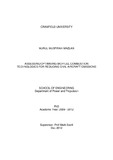JavaScript is disabled for your browser. Some features of this site may not work without it.
| dc.contributor.advisor | Savill, Mark A. | |
| dc.contributor.author | Mazlan, Nurul Musfirah | |
| dc.date.accessioned | 2013-05-31T13:41:50Z | |
| dc.date.available | 2013-05-31T13:41:50Z | |
| dc.date.issued | 2012-12 | |
| dc.identifier.uri | http://dspace.lib.cranfield.ac.uk/handle/1826/7941 | |
| dc.description.abstract | Gas turbines are extensively used in aviation because of their advantageous volume as weight characteristics. The objective of this project proposed was to look at advanced propulsion systems and the close coupling of the airframe with advanced prime mover cycles. The investigation encompassed a comparative assessment of traditional and novel prime mover options including the design, off-design, degraded performance of the engine and the environmental and economic analysis of the system. The originality of the work lies in the technical and economic optimisation of gas turbine based on current and novel cycles for a novel airframes application in a wide range of climatic conditions. The study has been designed mainly to develop a methodology for evaluating and optimising biofuel combustion technology in addressing the concerns related to over-dependence on crude oil (Jet-A) and the increase in pollution emissions. The main contributions of this work to existing knowledge are as follows: (i) development of a so-called greener-based methodology for assessing the potential of biofuels in reducing the dependency on conventional fuel and the amount of pollution emission generated, (ii) prediction of fuel spray characteristics as one of the major controlling factors regarding emissions, (iii) evaluation of engine performance and emission through the adaptation of a fuel’s properties into the in-house computer tools, (iv) development of optimisation work to obtain a trade-off between engine performance and emissions, and (v) development of CFD work to explore the practical issues related to the engine emission combustion modelling. Several tasks have been proposed. The first task concerns the comparative study of droplet lifetime and spray penetration of biofuels with Jet-A. In this task, the properties of the selected biofuels are implemented into the equations related to the evaporation process. Jatropha Bio-synthetic Paraffinic Kerosine (JSPK), Camelina Bio-synthetic Paraffinic Kerosine (CSPK), Rapeseed Methyl Ester (RME) and Ethanol are used and are evaluated as pure fuel. Additionally, the mixture of 50% JSPK with 50% Jet-A are used to examine the effects ofblend fuel. Results revealed the effects of fuel volatility, density and viscosity on droplet lifetime and spray penetration. It is concluded that low volatile fuel has longer droplet lifetime while highly dense and viscous fuel penetrates longer. Regarding to the blending fuel, an increase in the percentage of JSPK in the blend reduces the droplet lifetime and length of the spray penetration. An assessment of the effect of JSPK and CSPK on engine performance and emissions also has been proposed. The evaluation is conducted for the civil aircraft engine flying at cruise and at constant mass flow condition. At both conditions results revealed relative increases in thrust as the percentage of biofuel in the mixture was increased, whilst a reduction in fuel flow during cruise was noted. The increase in engine thrust at both conditions was observed due to high LHV and heat capacity, while the reduction in fuel flow was found to correspond to the low density of the fuel. Regarding the engine emissions, reduction in NOx and CO was noted as the composition of biofuels in the mixture increased. This reduction is due to factors such as flame temperature, boiling temperature, density and volatility of the fuel. While at constant mass flow condition, increases in CO were noted due to the influence of low flame temperature which leads to the incompletion of oxidation of carbon atoms. Additionally, trade-off between engine thrust, NOx, and CO through the application of multi-objective genetic algorithm for the test case related to the fuel design has been proposed. The aim involves designing an optimal percentage of the biofuel/Jet-A mixture for maximum engine thrust and minimum engine emissions. The Pareto front obtained and the characteristics of the optimal fuel designs are examined. Definitive trades between the thrust and CO emissions and between thrust and NOx emissions are shown while little trade-off between NOx and CO emissions is noted. Furthermore, the practical issues related to the engine emissions combustion modelling have been evaluated. The effect of assumptions considered in HEPHAESTUS on the predicted temperature profile and NOx generation were explored. Finally, the future works regarding this research field are identified and discussed. | en_UK |
| dc.language.iso | en | en_UK |
| dc.publisher | Cranfield University | en_UK |
| dc.rights | © Cranfield University 2012. All rights reserved. No part of this publication may be reproduced without the written permission of the copyright owner. | en_UK |
| dc.title | Assessing/Optimising Bio-fuel Combustion Technologies for Reducing Civil Aircraft Emissions | en_UK |
| dc.type | Thesis or dissertation | en_UK |
| dc.type.qualificationlevel | Doctoral | en_UK |
| dc.type.qualificationname | PhD | en_UK |
